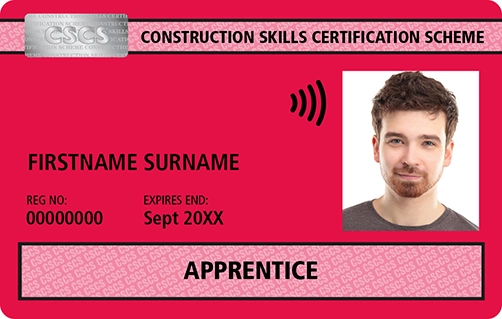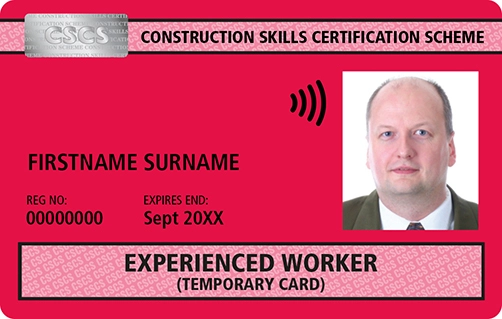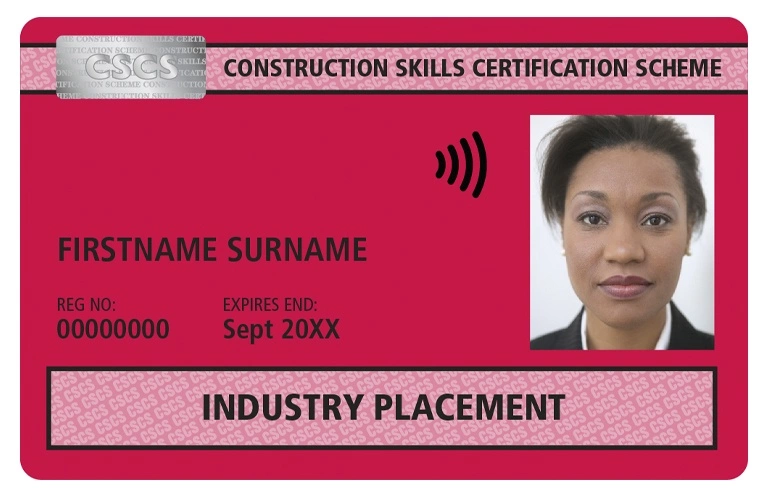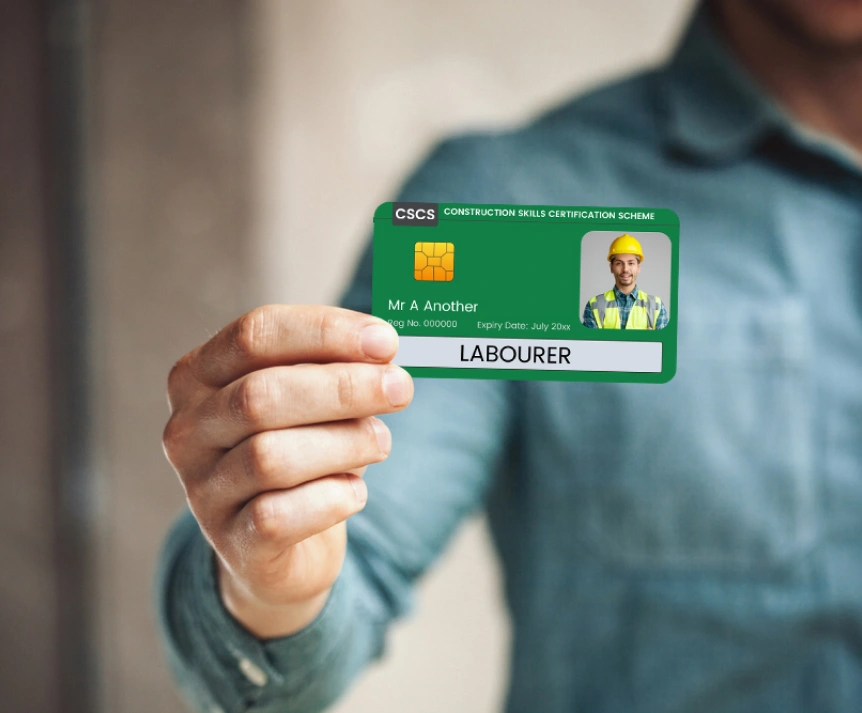CSCS Cards provide proof that you are a suitable candidate for a job in construction. And, if you temporarily need to access a construction site, the CSCS Red Card would do. This buys you time to complete your qualification, apprenticeship or probation period for a job. On expiry, you can upgrade to other CSCS cards.
There are many types of red cards, each with a different set of requirements. We’ll explore these types and find out which one goes with what you do.
What is a CSCS Red Card?
The CSCS Red Card is for those who want short-term access to a construction site. How long it’s valid for depends on which card you go for – it could be anywhere from 6 months to 5 years.
The Red Card allows you to maintain your job at a construction site while you’re undergoing a course. For example, if you’re a manager at a construction site and your employer asks you to level up to a CSCS Black Card. You just need to enrol on a Level 4 NVQ or higher, and temporarily obtain a CSCS Red Technical, Supervisor, and Manager Card. This card is effective for 3 years, and once you finish your course, you can upgrade to the CSCS Black Card.
You might not know about the CSCS Red Technical, Supervisor, and Manager Card, but we’ll explain who it’s for and how to get it in a later part of this blog.
What are the Different Types of CSCS Red Cards?
No two cards are alike when it comes to their applicability and impact on your career. In the following sections, we’ll cover who each of these cards is for, the required documentation, and the validity period.
Apprentice Card

As the name suggests, the CSCS Apprentice Card is intended for individuals who are registered on a recognised apprenticeship programme. What makes this card unique is that it is issued free of charge. Not to forget, if the card is lost, a regular fee will apply. Many individuals opt for the CSCS Green Card (Labourers) instead of going through the lengthy documentation process. To address this issue, CSCS has made the Apprentice Card completely free for those who are eligible.
Validity of an Apprentice Card:
The Apprentice Card has a validity period of 4 years and 6 months, and it cannot be renewed once it expires.
Eligibility Criteria:
For the Apprentice Card, you need to provide proof of being registered for an apprenticeship. Proof can be provided in any of the following forms:
- An email or letter from the managing agency of your apprenticeship
- A letter from your apprenticeship training provider
- Your Apprenticeship Agreement
You also need to pass a health and safety test. You can either take the CITB Health, Safety, and Environment test or pass any of the following alternatives:
A completion certificate for a one-day Construction Health and Safety Awareness Course.
A completion certificate for the Construction Health and Safety unit included in your induction or initial qualification.

Experienced Technical, Supervisor or Manager Card

The Experienced Technical, Supervisor, or Manager (TSM) Card is meant for individuals who have registered for a construction-related NVQ/SVQ Level 3, SVQ at SCQF Level 6 or higher. Besides that, you need to have at least one year of experience within the last three years.
Validity:
Once obtained, the TSM Card remains valid for a period of three years, but it cannot be renewed.
Eligibility Criteria:
- You need to upload a proof that you’re registered for the relevant qualification. This must include the name of the applicant, the qualification title, and the date of registration (DOR). Please note that the DOR must be within the past two years.
- You must have passed the CITB Health, Safety and Environment test in the last 2 years.
Experienced Worker

Not to confuse the TSM Card with the Experienced Worker card — this card specifically suits those individuals who are currently enrolled on a construction related NVQ/SVQ Level 2, SVQ at SCQF Level 5 or higher. As with other CSCS Red Cards, this too buys you time to upgrade to a skilled CSCS card later on. Along with that, you must also have at least one year job experience to become eligible for this card.
Validity:
The Experienced Worker Card is valid for 1 year. This card too can’t be renewed.
Eligibility Criteria:
A document confirming that you are registered for the relevant NVQ/SVQ Qualification. The document must include the following:
- Applicant Name
- Qualification Title
- Date of Registration (DOR)
You must pass the CITB Health, Safety and Environment test.
Trainee Card

The Trainee Card is for those who are enrolled on either a vocational or academic qualification. This route is best suited to you if you intend to take on a part-time role along with a traditional learning pathway. You get ample time to complete your qualification and upgrade to any skilled CSCS card after it expires. Like other CSCS Red Cards, you cannot renew it.
Validity:
Amongst all CSCS Red Cards, the Trainee Card stays valid for the longest – five years.
Eligibility Criteria:
- You must possess a document showing that you’re registered for a qualification. The Date of Registration (DOR) for a vocational qualification must be within the last two years, while for an academic qualification, it must be within the previous four years.
- You must pass the CITB Health, Safety and Environment test.
Industry Placement

The Industry Placement Card is for those who’ve signed up for construction-related training programmes or qualifications. One mandatory requirement that you need to check before you decide to pursue this card is that the programme or qualification must include at least 30 days of work placement such as the Trainee Skills Development Programme.
Validity:
The Industry Placement Card is valid for 3 years. This card can’t be renewed once expired.
Eligibility Criteria:
- Must be aged 16 or above
- Must be registered for a qualification including a minimum of 30 days’ work placement
- Must have passed the CITB Health, Safety and Environment test in the last 2 years
How to Get a CSCS Red Card?
Applying for a CSCS card can be challenging if you’re unsure about the right path to follow. Let’s explore how you can obtain a CSCS Red Card and the factors you need to consider before deciding to apply.
Find the Right CSCS Red Card
By now, you probably know which card suits your job in the industry. Like, if you’re on probation, you’d want a CSCS Provisional Card. If you need to get on the site for your training, then the Red Industry Replacement Card is what you need. If you skipped straight to this point, just give the article a quick read from the top to see which card is right for you.
Meet the Requirements
Next up is submitting the required documents. Like, if you’re going for an apprentice card, you must show that you’re officially signed up as an apprentice. And each card has its own checklist of things you must meet before moving on to the next part.
Pass the CITB Health, Safety and Environment Test
This test checks what you know about health and safety practices on a construction site– it’s called the CSCS test. CSCS stresses on following safety rules on construction sites, so they make everyone get through this test to earn their CSCS cards.
To prepare for the CSCS Test, you can give these CSCS Mock Tests a shot without paying anything. It’ll help you understand how the test works.
Apply for the CSCS Red Card
Make sure you have these documents with you:
1. Scan of your qualification
2. CITB Test ID Number (find it at the top of your pass certificate)
Do you qualify for the card you want? If yes, you can apply on the CSCS online portal.
You should get your card in 3-5 workdays. If you apply over the phone, this might take up to 10 days.
How Much Does a CSCS Red Card Cost?
The application fee for the CSCS Red Card is £36, in fact there’s an exception – there’s no application fee to apply for the Red Apprentice Card. Additionally, you also need to pay £22.50 to book the CITB Health, Safety and Environment test.
Once you submit your application for a CSCS Red Card through the online portal, it typically takes approximately 3-5 working days to receive your card
How to Renew a CSCS Red Card?
CSCS Red Cards are issued on a temporary basis, allowing you some time to complete your qualifications. Unfortunately, this means that these cards cannot be renewed once they expire. However, if you’re interested in learning about how to renew other types of CSCS cards, we’d be happy to guide you. This blog post will provide you with a detailed and informative guide that will help you understand the renewal process for different CSCS cards.
Are There Any Exemptions for Specific Roles or Qualifications?
If your job isn’t in construction, you might not really need a CSCS card. Even though these cards are known and often needed for UK construction sites, it’s not always a must. Let’s say you’re aiming to be an on-site security guard, you don’t really have to bother with a CSCS card. Same goes for jobs like hoist installer, assessor, site nurse, frame designer, upholsterer, tyre fitter, vending machine installer, and more. The Construction Leadership Council (CLC) explains it like this:Download our Managers and Professionals Test Prep Book for free!
×
Frequently Asked Questions (FAQs)
What does a Red Card mean?
The CSCS Red Card is like a short-term pass for getting onto a construction site temporarily.
How long does a CSCS Red Card stay valid for?
The validity of CSCS Red Cards ranges from 6 months to 5 years. For instance, the Apprentice Card remains valid for 4 years and 6 months, while the Provisional Card is valid for only 6 months. The duration primarily depends on the type of Red Card for which you are applying.
Is a CSCS card a legal requirement?
You don’t have to legally have a CSCS card for construction work, but lots of employers like it. In fact, the industry is all set to switch to a 100% CSCS-certified workforce.
Conclusion
The information in this blog should’ve guided on why to get the CSCS Red Card and how it sets you up for the Black Card upgrade. The Red Card is more of an entry ticket to the construction world.
While you’re getting your Red Card sorted, it’s a good call to peek at these construction NVQs. They’ll help you gear up for a solid future in the construction industry.




